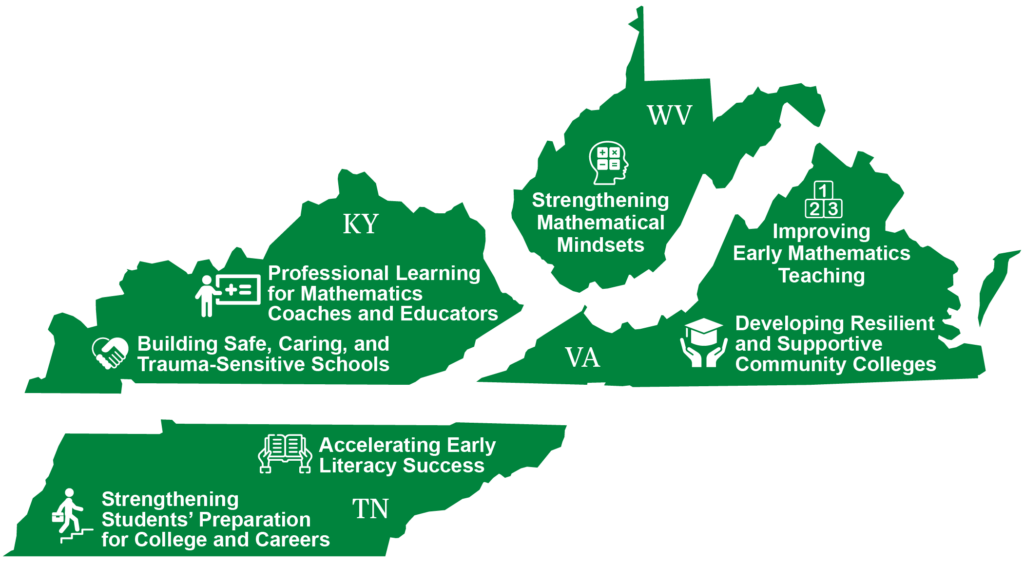A partner in advancing equitable access and outcomes for learners in Kentucky, Tennessee, Virginia, and West Virginia.
Led by SRI Education, the Regional Educational Laboratory (REL) Appalachia partners with educators and leaders to engage in rigorous, change-oriented research and provides support that informs local, regional, and statewide decisions about education policies, programs, and practices. REL Appalachia provides services at no cost to state and local partners.
REL Appalachia builds capacity by:
- Conducting research that addresses high-priority needs and examines what is working in schools and institutions of higher education.
- Providing training, coaching, and technical support for the use of data and evidence-based practices.
- Sharing important findings with educators and leaders in a timely, accessible, and actionable manner.
REL Appalachia is 1 of 10 RELs funded by the Institute of Education Sciences to support a more evidence-based education system. The REL Appalachia team brings content and methodological expertise across a range of critical education topics and needs. Current activities are focused on the following topics.

Examples of how REL Appalachia has supported partners in the region:
Strengthening students’ preparation for college and careers
District partners want to ensure all students are graduating from high school ready for college and careers. In support of this goal, REL Appalachia is engaging in several research and technical assistance projects to help partners use data to monitor implementation and outcomes to determine whether existing programs are meeting students’ needs. As a framework for these efforts, we developed an infographic that describes research-based strategies educators can use to help students graduate from high school prepared for multiple options for the future.


Developing trauma-sensitive schools and postsecondary institutions
Students in REL Appalachia’s four-state region and across the country are facing stress and trauma from a variety of sources, which can impact student learning, mental health, and other aspects of well-being. In response, REL Appalachia is partnering with leaders from school districts and postsecondary institutions to develop trainings and other resources on evidence-based, trauma-sensitive approaches for interacting with students in and outside of the classroom. For example, this training series provides evidence-based strategies K–12 educators can use to support students and educators who have experienced trauma. This fact sheet summarizes the impact of trauma, related symptoms or signs, and practices and policies to implement in postsecondary settings.
Clients & partners
- Education Development Center
- Erikson Institute
- Westat
- L-Evation, LLC
- Magnolia Consulting, LLC
- Plus Alpha Research & Consulting, LLC
Our work
Example research products
- Algebra I and College Preparatory Diploma Outcomes Among Virginia Students Who Completed Algebra I in Grades 7 – 9
- Nonacademic Interventions for Postsecondary Enrollment and Success with Rural and High-Poverty Populations: A Systematic Evidence Review
- Career and Technical Education Credentials in Virginia High Schools: Trends in Attainment and College Enrollment Outcomes
Resources for school and district leaders
Associated field of research
Associated SRI team members
-

Victoria A. Schaefer
Senior Principal Education Researcher and TA Provider, SRI Education
-

Mary M. Klute
Principal Education Researcher, SRI Education
-

Katrina Laguarda
Senior Researcher, SRI Education
-

Douglas J. Gagnon
Principal Education Researcher, SRI Education
-

Kerry Friedman
Principal Education Researcher and Technical Assistance Provider, SRI Education
-

Kirby A Chow
Senior Education Researcher, SRI Education
-

Hannah Cheever
Senior Education Researcher, SRI Education
-

Louise Yarnall
Senior Research Social Scientist, SRI Education
-

Erika Gaylor
Principal Senior Researcher and Early Childhood Program Leader, SRI Education



